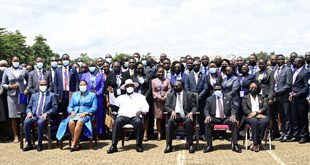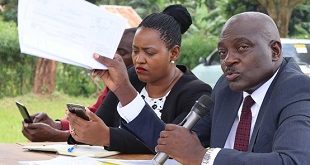
Kampala, Uganda | FLAVIA NASSAKA | As 2017 ended, many political pundits, the clergy, and academicians used their pulpits and punditry to describe what, in their view, the year had been like and predict 2018.
Makerere University professor of Political Science, Sabiti Makara, said political intolerance has been on the increase and that “Ugandans are becoming angrier by the day as their financial status is not improving yet when they switch on their TV sets all they see is some clique of MPs and civil servants sharing millions of taxpayers’ money.”
Church of Uganda Archbishop Stanley Ntagali spoke of political upheavals, anarchy, mysterious killings, deaths, and perverse behaviours.
“Our society is drifting into a state of godlessness, lawlessness and perverse disregard of human life and dignity,” he said.
Apostle Joseph Sserwadda of Victory Christian Centre in Ndeeba, Kampala, said Ugandans find themselves living in “a different kind of world, one less predictable and certain”. He said the new world is filled with fear, divisions, greed, and selfishness.
“It is as if we are in the midst of a creepy darkness revealed by senseless violence, economic hard times, political deadlocks, and spiritual coldness,” he said.
Archbishop John Baptist Odama of the Catholic Church, who is the Chairman of the Uganda Episcopal Conference, spoke of a “mood of political anxiety”.
Bishop Wilberforce Kityo Luwalira of Namirembe Diocese (Church of Uganda) in Kampala said “people are disgruntled.”
Crispy Kaheru, the Coordinator of the Citizens Coalition for Electoral Democracy (CCEDU), spoke of “a complete loss of confidence in representative democracy.”
Forum for Democratic Change (FDC) party stalwart, Kizza Besigye, said “Ugandans have been pushed to the wall by removing the only remaining safeguard to allow for peaceful transfer of power.”
At the centre of the tense Christmas sermons and terse observations appears to be what was; without a doubt, the defining event of 2017: the passing by parliament of an amendment to the constitution to scrap Article 102 (b) which fixed the presidential age-limit at 75 years of age.
As a result of that, many commentators predicted that 2018 will be a tough year, filled with political, social and, economic tension.
Hope and doom in 2018
But many others, especially the clergy like Bishop Luwalira called for “interventions that will restore people’s hope.”
“We truly needed a word of positive good news to give us hope,” Sserwadda said.
“Cry my beloved country! We don’t really know what the future holds,” Odama said, and added “We must not lose hope.”
But others, like Kaheru, predict doom in 2018.
“We are likely to see more citizens’ action either through protests, civic action or petitions since they now know voters voice has little influence in terms of what goes on in parliament,” he said.
Kaheru’s organization is a member of the Uganda Governance Monitoring Platform (UGMP) that among others assesses and monitors performance of leaders.
He said because of what he called the “complete loss of confidence in representative democracy” people will try to extend their voice but will most likely be met with brutality from security operatives.
His prediction is shared by Besigye who is one of the biggest victims of brutality by security forces.
Speaking to journalists at his Katonga Road-based offices in Kampala, Besigye said Ugandans are likely to copy what takes place in other countries where leaders have failed to abide by the dictates of their constitution.
He cited the neighbouring DR Congo where the government routinely battles protest after protest as citizens demand that President Joseph Kabila steps down after his term ended in December 2016 and he has been making moves to remove presidential term limits.
 The Independent Uganda: You get the Truth we Pay the Price
The Independent Uganda: You get the Truth we Pay the Price


